
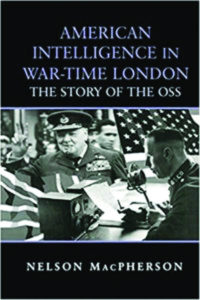
American Intelligence in War-time London: The Story of the OSS
Nelson MacPherson
Routledge (2014)
Based on OSS records only recently released to US National Archives, and on evidence from British archival sources, this is a thoroughly researched study of the Office of Strategic Services in London. The OSS was a critical liaison and operational outpost for American intelligence during World War II. Dr MacPherson puts the activities of the OSS into the larger context of the Anglo-American relationship and the various aspects of intelligence theory, while examining how a modern American intelligence capability evolved.
Following the Allied landing at Normandy in June 1944, the OSS dispatched over 200 spies into Nazi Germany. The London office of the Secret Intelligence Branch (SI), under the leadership of the late CIA director William J. Casey, organized and dispatched over 100 missions from September 1944 through April 1945. Agents recruited from the ranks of church dissidents, Spanish civil war veterans, political refugees, and underground labor groups throughout occupied Europe gathered military intelligence critically important to the advance of the Allied armies, leading to the surrender of Germany on 8 May 1945.
Nelson MacPherson is an analyst in Canada’s Department of National Defence. He holds a PhD in History from the University of Toronto and is an Adjunct Fellow with the Centre for Military and Strategic Studies, University of Calgary.
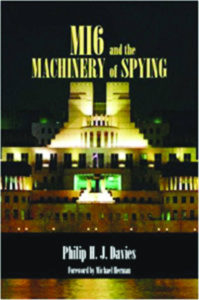
Mi6 and the Machinery of Spying: Structure and Process in Britain’s Secret Intelligence
Philip H. J. Davies
Routledge (2004)
Philip H. J. Davies is one of a growing number of British academic scholars of intelligence, but the only academic to approach the subject in terms of political science rather than history. He wrote his PhD at the University of Reading on the topic ‘Organisational Development of Britain’s Secret Intelligence Service 1909-1979’, and has published extensively on intelligence and defence issues. After completing his PhD he taught for a year and a half on the University of London external degree programme in Singapore before returning to the UK to lecture at the University of Reading for two years. He was formerly Associate Professor of International and Security Studies at the University of Malaya in Malaysia where he not only conducted his research but provided a range of training and consultancy services to the Malaysian intelligence and foreign services. He is now based at Brunel University, UK.
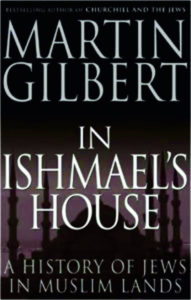
In Ishmael’s House: A History of Jews in Muslim Lands
Martin Gilbert
Yale University Press (2011)
The relationship between Jews and Muslims has been a flashpoint that affects stability in the Middle East and has consequences around the globe. In this absorbing and eloquent book Martin Gilbert challenges the standard media portrayal and presents a fascinating account of hope, opportunity, fear, and terror that have characterized these two peoples through the 1,400 years of their intertwined history.
Harking back to the Biblical story of Ishmael and Isaac, Gilbert takes the reader from the origins of the fraught relationship—the refusal of Medina’s Jews to accept the Holy Prophet Muhammad (PBUH) as a prophet—through the ages of the Crusader reconquest of the Holy Land and the great Muslim sultanates to the present day. He explores the impact of Zionism in the first half of the twentieth century, the clash of nationalisms during the Second World War, the mass expulsions and exodus of 800,000 Jews from Muslim lands following the birth of Israel, the Six-Day War and its aftermath, and the political sensitivities of the current Middle East.
‘In Ishmael’s House’ sheds light on a time of prosperity and opportunity for Jews in Muslim lands stretching from Morocco to Afghanistan, with many instances of Muslim openness, support, and courage. Drawing on Jewish, Christian, and Muslim sources, Gilbert uses archived material, poems, letters, memoirs, and personal testimony to uncover the human voice of this centuries-old conflict. Ultimately Gilbert’s moving account of mutual tolerance between Muslims and Jews provides a perspective on current events and a template for the future.
Sir Martin Gilbert is the author of more than eighty books, including the six-volume authorized biography of Winston Churchill.
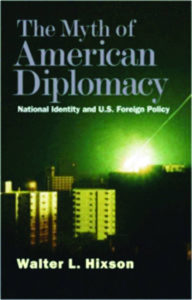
Myth of American Diplomacy: National Identity and U.S. Foreign Policy
Walter Hixson
Yale University Press (2009)
In this major reconceptualization of the history of U.S. foreign policy, Walter Hixson engages with the entire sweep of that history, from its Puritan beginnings to the twenty-first century’s war on terror. He contends that a mythical national identity, which includes the notion of American moral superiority and the duty to protect all of humanity, has had remarkable continuity through the centuries, repeatedly propelling America into war against an endless series of external enemies. As this myth has supported violence, violence in turn has supported the myth.
‘The Myth of American Diplomacy’ shows the deep connections between American foreign policy and the domestic culture from which it springs. Hixson investigates the national narratives that help to explain ethnic cleansing of Indians, nineteenth-century imperial thrusts in Mexico and the Philippines, the two World Wars, the Cold War, the Iraq War, and today’s war on terror. He examines the discourses within America that have continuously inspired what he calls our “pathologically violent foreign policy.” The presumption that, as an exceptionally virtuous nation, the United States possesses a special right to exert power only encourages violence, Hixson concludes, and he suggests some fruitful ways to redirect foreign policy toward a more just and peaceful world.
Walter L. Hixson is professor of history at the University of Akron. He has published numerous books and articles on the history of U.S. foreign policy, including the prize-winning book George F. Kennan: Cold War Iconoclast. He lives in Fairlawn, OH.
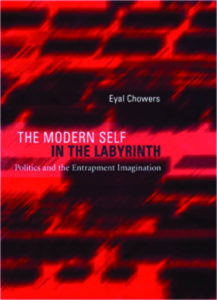
The Modern Self in the Labyrinth: Politics and the Entrapment Imagination
Eyal Chowers
Harvard University Press (2004)
This book explores the distinct historical-political imagination of the self in the twentieth century and advances two arguments. First, it suggests that we should read the history of modern political philosophy afresh in light of a theme that emerges in the late eighteenth century: the rift between self and social institutions. Second, it argues that this rift was reformulated in the twentieth century in a manner that contrasts with the optimism of nineteenth-century thinkers regarding its resolution. It proposes a new political imagination of the twentieth century found in the works of Weber, Freud, and Foucault, and characterizes it as one of “entrapment.”
Eyal Chowers shows how thinkers working within diverse theoretical frameworks and fields nevertheless converge in depicting a self that has lost its capacity to control or transform social institutions. He argues that Weber, Freud, and Foucault helped shape the distinctive thought and culture of the past century by portraying a dehumanized and distorted self marked by sameness. This new political imagination proposes coping with modernity through the recovery, integration, and assertion of the self, rather than by mastering and refashioning collective institutions.
“This is an erudite and original study of the great entrapment and proto-entrapment theorists of the 19th and 20th centuries, namely, Kant, Mary Shelley, Marx, Nietzsche, Weber, Freud, Benjamin, Kafka and Foucault. As Chowers convincingly shows, these theorists argue that moderns have come to be subject to and subjectified by historical processes that govern their conduct. Nevertheless, they go on to argue that moderns are able to overcome this state of ’immaturity’ and become ’mature’ in two diametrically opposed ways: either to overcome this subjection and become sovereign and autonomous over these processes (in proto-entrapment theories); or to acknowledge and learn to live within these processes as an ineliminable condition of being-in-the-world (in entrapment theories). The interpretation of individual authors and the story as a whole are presented with an exemplary depth of scholarship and insight, and the cumulative effect is to throw a critical and foreboding light on the present.”—James Tully, University of Victoria
“This book identifies the theme of “social entrapment” in three important 20th century social theorists: Weber, Freud, and Foucault. It ably shows how the theme emerged from the problems of the Enlightenment and attempts by Marx and Nietzsche to solve them. It also points out some of the dead ends to which it has led its expositors. An impressive combination of research and argument.”—Bernard Yack, Brandeis University

